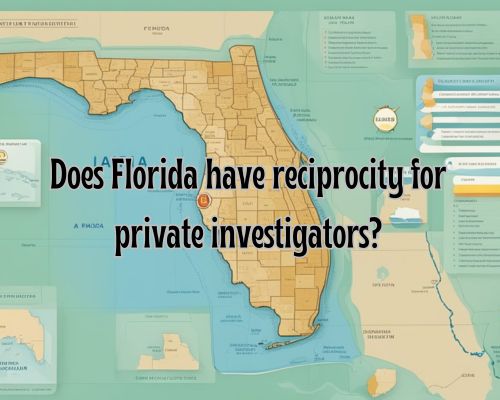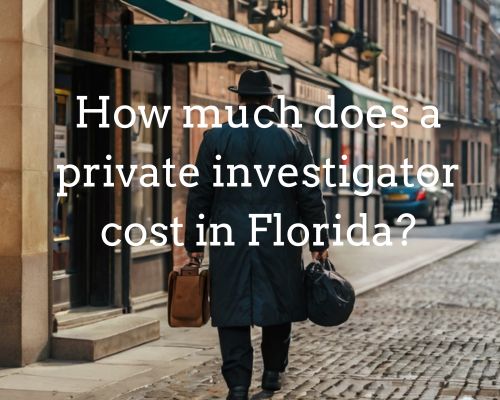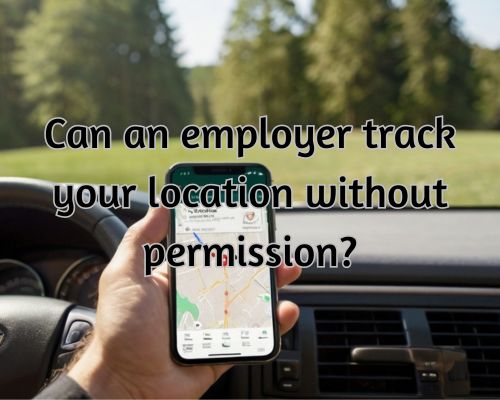Navigating the rules for private investigators can be challenging, especially when it comes to working across state lines.
Florida does have reciprocity agreements that allow private investigators licensed in other states to conduct investigations within Florida. However, these agreements have specific conditions that must be met to be valid.

For example, private investigators operating in Florida under a reciprocity agreement must be licensed in their home state and associated with a licensed private investigative agency. Additionally, the investigation must have originated in the investigator’s home state.
These requirements ensure that only qualified professionals conduct investigations in Florida.
Sherlock Holmes from Ali Private Investigator Tampa highlights that understanding these reciprocity agreements can save you time and effort by avoiding unnecessary licensing processes. The nuances in the regulations also emphasize the importance of staying updated with both Florida’s and your home state’s requirements.
Licensing Requirements for Private Investigators in Florida
To become a licensed private investigator in Florida, you must meet specific requirements. These include an application process, examination, and continuous education. Additionally, Florida has reciprocity agreements that allow licensed investigators from certain states to practice temporarily in Florida.
Initial Application and Examination Process
To start your journey as a private investigator in Florida, you first need to submit an Initial Application for Licbense. Florida Statutes Chapter 493 outlines the requirements, mandating that you undergo an Investigation of Applicants, which includes a background check.
After your application is reviewed, you must pass an Exam that tests your knowledge of Florida laws, ethical practices, and investigative procedures. The Department of Agriculture and Consumer Services oversees the licensing authority, ensuring compliance with state laws.
Reciprocity Agreements Between States
Reciprocity Agreements allow private investigators licensed in specific States and Territories to operate temporarily in Florida. This is particularly useful for following leads that originated outside Florida but require further investigation within its borders.
Florida has entered into reciprocity agreements with seven states, enabling exchange and collaboration on cases. These agreements are governed under Florida Regulations 5N-1.121, ensuring that out-of-state private investigators meet Licensure Requirements consistent with Florida’s standards.
Renewal and Continued Education
Licensed private investigators must submit a Renewal Application for Licensure regularly to maintain their status. The renewal process includes proof of Continued Education, ensuring that all licensees stay current with evolving laws and investigative techniques.
Continued education ensures that investigators are updated on any changes in Florida Statutes Chapter 493 and are trained in the latest technologies and methodologies.
Failure to comply with these requirements can result in Disciplinary Action or revocation of the license.
Regulations and Compliance for Conduct
As a private investigator in Florida, you must adhere to specific regulations and compliance standards to maintain your license. These include understanding legal boundaries, maintaining privacy, and using firearms and equipment properly. Let us understand more with Sherlock Holmes from Ali Private Investigator Tampa.
Legal Boundaries and Disciplinary Actions
You must operate within legal boundaries outlined by Florida Statutes Chapter 493. Activities must be conducted within the scope of the law, ensuring no violations occur.
Failure to adhere can result in disciplinary actions from the Florida Department of Agriculture and Consumer Services, such as fines, suspension, or revocation of licenses.
Disciplinary actions can also result from unethical conduct. Activities like making false reports, conducting unauthorized investigations, or violating confidentiality agreements can lead to severe penalties. The Commissioner of Agriculture oversees these matters and ensures industry standards are upheld.
Privacy and Ethical Considerations
Privacy and ethics are paramount in your practice. You must maintain confidentiality and not divulge investigative information without proper authorization.
Handling sensitive information requires strong adherence to ethical standards and legal guidelines to avoid compromising client privacy.
You must avoid surveillance practices that infringe on privacy rights. Ethical considerations also include treating all parties with respect and not engaging in activities that can be construed as harassment or intimidation. This ensures public trust in the profession.
Use of Firearms and Other Equipment
If you carry firearms or other equipment, you must comply with state regulations.
Proper training and licensing for firearms are essential.
The use of any equipment in your duties should be within the legal framework and not endanger public safety.
Equipment used must be maintained and operated according to best practices.
This includes communication devices, surveillance tools, and other investigative gear.
Adhering to these standards ensures not only compliance but also the effectiveness and professionalism of your service.
Following these regulations upholds the integrity of your role as a private investigator in Florida.


